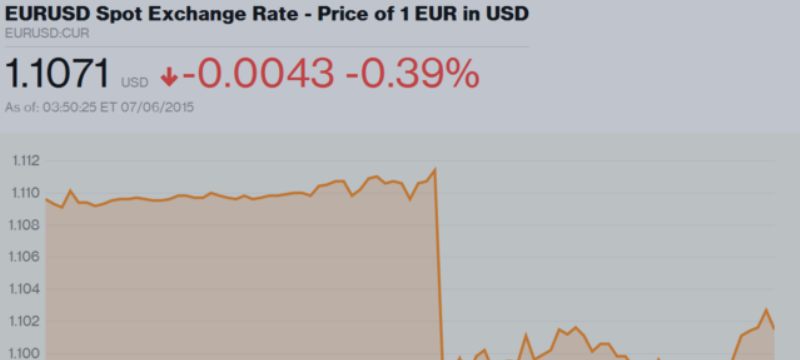
Greek Contagion Across Markets Muted as Crisis Seen Quarantined
Financial markets barely shuddered at the increased prospect of Greece’s exit from the euro, a sign investors see the financial crisis there as quarantined for now.
The euro dropped less than 1 percent and stock volatility fell the most in two weeks after Greeks voted in a referendum Sunday to reject their creditors’ austerity terms for aid. The Stoxx Europe 600 Index fell 0.9 percent at 8:25 a.m. in New York, and Standard & Poor’s 500 Index futures lost 0.8 percent. Greece’s two-year note dropped 12.5 cents to 45.60 cents on the euro. Shanghai shares rose amid intensifying efforts to arrest a $3.2 trillion selloff.
“Everybody seems to be aware that Greece is an isolated case,” said Daniel Lenz, lead market strategist at DZ Bank AG in Frankfurt.
While investors sold riskier assets, the declines were muted compared with a week ago amid speculation the resignation of Greek Finance Minister Yanis Varoufakis may aid talks with creditors. The European Central Bank is due to evaluate its next move today as German Chancellor Angela Merkel and French President Francois Hollande hold talks in Paris before euro-area leaders meet on Tuesday.
‘Muted Reaction’
The euro weakened versus 14 of its 16 major peers, paring declines against the dollar and yen and erasing losses versus the Swiss franc. The yield on Spain’s 10-year bond rose 12 basis points to 2.33 percent and Italy’s climbed 11 basis points to 2.36 percent. Both yields jumped more than 20 basis points on June 29, the first trading day after Greece announced the referendum.
“The muted reaction implies the market is not too worried about a Grexit,” said Jan von Gerich, chief strategist at Nordea Bank AB in Helsinki. “It is still early, and bigger moves may well surface in the near future, but I do not expect to see the start of another financial crisis. For now, the ECB can be happy that already the existence of support facilities seems to suffice.”
Credit Risk
The Markit iTraxx Europe Index climbed four basis points to 79 basis points, according to data compiled by Bloomberg. A gauge of financial companies’ credit-default swaps rose five basis points to 97 basis points, the highest since March 2014.
A U.S.-listed exchange-traded fund tracking Greek stocks fell 9.7 percent in early New York trading, while American depositary receipts of National Bank of Greece SA plunged 16 percent. Greece’s stock exchange has been closed for the past week.
Banks led declines in the Stoxx 600 as more than eight shares fell for every one that rose. Trading volumes were 13 percent greater than the 30-day average, according to data compiled by Bloomberg.
Rolls-Royce Holdings Plc slumped 8.3 percent after cutting its full-year profit forecast and halting a share-buyback program to preserve cash.
Humana Inc. climbed 3.3 percent in early New York trading after Aetna Inc. agreed to buy the rival health insurer last week. Aetna fell 2.6 percent.
E-mini futures on the S&P 500 dropped after the index posted its biggest weekly decline since March, falling 1.2 percent last week.
The MSCI Emerging Markets Index lost 2.1 percent, the most in a week. Russia’s ruble and South Africa’s rand fell at least 0.7 percent.
China Rout
The Hang Seng China Enterprises Index of mainland companies listed in Hong Kong declined for a third day, sliding 3 percent. The Shanghai Composite Index gained even as two shares fell for every one that rose, amid government efforts to shore up a market that has tumbled 27 percent from its June 12 peak. Over the weekend, China suspended initial public offerings, while brokerages pledged to buy shares and the central bank said it would provide liquidity for margin trading.
Copper for delivery in three months slid as much as 4.2 percent to the lowest price since Feb. 3. Nickel fell as much as 4 percent, while lead and aluminum were both close to entering bear markets.
Gold for immediate delivery slipped 0.4 percent to $1,164.28 an ounce in London trading. Platinum and palladium both dropped more than 1 percent.
Crude oil retreated, with Brent falling 1.1 percent to $59.68 a barrel in London trading, dropping below the $60-dollar mark for the first time since mid-April. In New York, West Texas Intermediate slid 3.2 percent to $55.12 a barrel, and touched the lowest since April 15.
Agricultural products also declined, with corn falling 1.6 percent to $4.22 a bushel on the Chicago Board of Trade. Wheat fell 1.6 percent and soybeans retreated 1.4 percent.
(Earlier versions of this story corrected the time stamp to London and the level of the euro’s 12-year low. ) https://www.mql5.com/en/signals/111434


